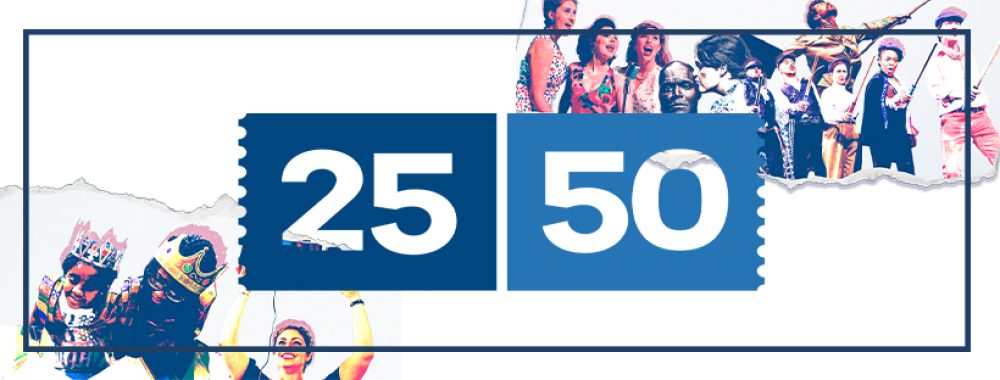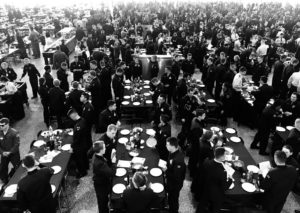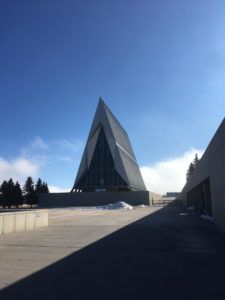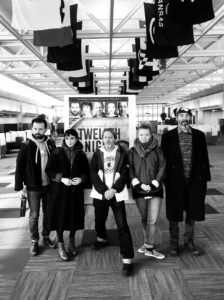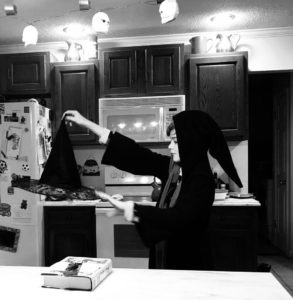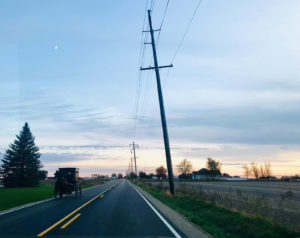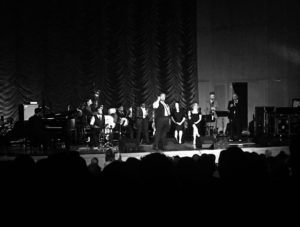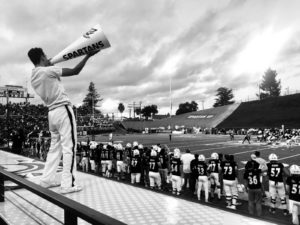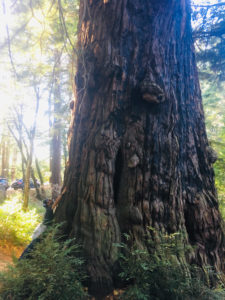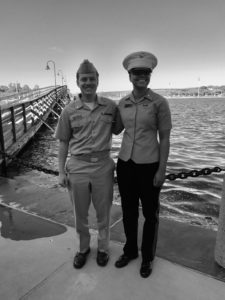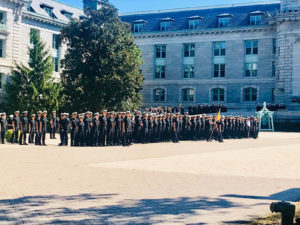Week Fifteen: United States Air Force Academy, Colorado Springs, Colorado
By Kaffe Keating
“But that’s all one, our play is done.”
– Feste, Act 5 Scene 1
And after what feels like a lifetime and no time at all, we’re arriving at our final destination, Colorado Springs. Where the Rocky Mountains rear up on one side, and the plains of middle America on the other.
We’re finishing off our tour at another military academy. This time we’ll be the guests of the US Air Force. The United States Air Force Academy, or USAFA for short (think of Simba’s dad and you’ll get the pronunciation), sits high above the city of Colorado Springs, nestled within the mountains themselves.
My grandfather was an RAF pilot who got picked to be part of an exchange to the US and so flew with the US Air Force during his training. It’s funny to think that I’ll be teaching in some of the classrooms where officers he would have known received their own education.
Our flight from Indianapolis takes us into Denver, known as the Mile High City because its official elevation is exactly one mile, or 5280 feet, above sea level. An hour and a half later we climb a bit higher and arrive at Colorado Springs (6035 feet) and our hotel, with its incredible mountain view.
We’re met by Lieutenant Colonel Bill Lee, who’s one of the instructors at USAFA and who’s
organised the residency. He’s the one who first lets us know that the altitude may be more of a factor in our week than we thought…
“Oh, by the way, you’ll need to drink a lot more water than you usually do. You don’t want to get altitude sickness.”
Altitude sickness. Brilliant. I suppose it’s fitting that the cadets here train at altitude; I know that
marathon runners often train at higher elevations so that their bodies can adapt to the thinner air. Then they’re able to use all the extra red blood cells they’ve made to carry extra oxygen to their muscles for the race itself.
We, however, are doing the opposite. We’ve been in Indiana for a fortnight. If you’ve been to
Indiana, you know that altitude sickness is probably the last thing you’d need to worry about.
Warsaw, where we were last week stands at a modest 823 feet.
“Drink lots of water. And maybe lay off the booze for the first few days,” says Bill. The academy, which we can see from our hotel window, is even higher than Colorado Springs itself, 7258 feet up in the air.
The problem with altitude is that the air gets thinner the higher you go, meaning that there’s less oxygen available for stuff like, you know, moving around. This can cause fatigue (because god knows we need more of that), nausea and, the Shakespearean actor’s favourite, shortness of breath. You also start vomiting and stuff when it gets really bad. I decide to heed Bill’s advice, lay off the beers and drink enough water that I’m in search of a restroom every half hour.
It’s AFTLS’ first time at USAFA (we decided that the fight over who could get the most letters into an acronym should end in a draw), and we’re aware of the importance of making a good first impression on the way to our final faculty meeting, where we meet the tutors whose classes we’ll be commandeering. But, as ever, everyone is incredibly friendly and inviting and it promises to be an interesting week of teaching.
We’ve only got the one show at USAFA, which will be our final US performance. Our burgeoning outcry is quashed, however, when we learn about the size of the theatre. Arnold Hall, the theatre on base, seats over 2700 people – we’re not going to need more than one performance in a space that big. It’s absolutely massive, more than twenty times bigger than Grace College’s Little Theatre. In the space of two weeks we will have performed in the smallest and biggest auditoria of the tour, one after the other. Talk about adapt or die…
On one of the days we were treated to lunch with the cadets, who all eat together in the vast Mitchell Hall. Just like at the Naval Academy, the cadets are required to march in in sections to the sound of the academy brass band playing the Air Force song, before sitting down to eat.
“They call this the longest table in the world,” Colonel Kathleen Harrington, who runs the English department, tells us as we survey the cadets all chowing down. “Because the freshman sit at one end of the table, and at the other end of the table is a senior. It’s the longest table, because it takes four years to get from one end to the other.” The cadets sit not in year groups, but in squadrons with the older, more experienced cadets guiding, and in some cases policing, the younger ones.
The academy itself is quite different to what I imagined. I suppose after visiting the Naval Academy and walking around their yard, I was expecting architecture of the same mid-1800s feel. But the Air Force, of course, is a much younger branch of the military; the academy was founded over a hundred years later and thus has a more modern, functional design. The standout, however, is the incredible chapel, which was, unfortunately, closed for renovation for the next four years. I guess they’ll just have to have us back then so we can check it out…
Bill, along with an ex-student of the academy, Captain Kelly Griffith, was kind enough to take us of a tour of the campus, talking us through the various traditions which the students observe after graduating. Freshman have to run everywhere in straight lines, everybody jumps in a fountain after they graduate, and every graduating year group has its own unique insignia. Kelly pointed out the one for 2013 which featured a pig’s snout on a nose of a plane. This was because that year, during their basic training, about a third of the cadets contracted swine flu. There’s a joke about pigs flying in there somewhere, but I won’t put you through that.
We rocket through the week until we arrive at our first and final performance, on a chilly Colorado evening. It’s abundantly clear how much breath we’re going to need. Big spaces like this always require a lot of diaphragm in order to both be heard and avoid damaging your vocal cords in the process. But here we’ve got the added element of being up in the mountains, 7000 feet above sea level. Bill was kind enough to buy us a couple of mini oxygen tanks, the sort I guess you’d use when climbing Everest, and we kept one behind the chairs on stage just in case.
It turned out to be a wonderful show, and a fitting end to our time both at USAFA and in the United States itself. We had been told to expect roughly 200 cadets, but we were greeted on stage by an audience of about 600 – not a bad turnout at any stretch.
After the show, walking to the cadet’s SU bar, Bill told us about two big wins. One of his students, who had been struggling to understand the play in class, came up to him after the show and simply said: “I get it.” This is precisely what we’re trying to do. There’s loads of incredible stuff you can do when studying Shakespeare in the classroom, there’s no denying it. Loads of interesting, clever stuff. But what is so often overlooked, so often forgotten or shied away from, is reading it and hearing it aloud. That was always the way it was intended to be received; through the ears, not the eyes. Words hit us in a different place that way. The second win was that another of Bill’s students preferred our version to the filmed performance at the Globe from a few years ago. Eat it, Rylance.
In one of her classes with some seniors, one of Katherine’s students told her that in the military, they spent so much time having to play a role – living up to whatever their duties demanded of them – that it was a rare treat to spend some time actually being themselves. Oddly, that’s sort of what theatre’s all about, I think. Not so much putting on a mask, as showing people what you really, truly look like when you take your mask off, and then encouraging them to do the same.
With the tour over and the final US performance done, all that remains are the two final
performances back in London at the John Lyons Theatre at the end of November. In the meantime, our group of five will temporarily diverge, some continuing to explore this incredible, beautiful country, and some heading back to the country we call home.
It’s been an incredible ten weeks. I’ve started to feel at home here, finally. This huge, sprawling land with its giant cars, self-flushing toilets, cowboy boots, fall colours, marines and sailors, giant redwoods, generous townsfolk, Amish settlements, and stretching mountain ranges.
Cheerio, America. We’re off to that little island you had that barney with a few hundred years ago, but we’ll be back. Thanks for having us.
